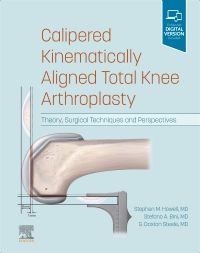Calipered Kinematically aligned Total Knee Arthroplasty, 1st Edition
Calipered kinematic alignment was proposed by Dr. Stephen M. Howell to enable the accurate and individualized placement of total knee components coincident within ± 0.5 mm of the patient’s pre-arthritic alignment. The aim was to restore the patient's native joint kinematics and thereby address the well documented 20% dissatisfaction when total knee replacement is performed using traditional, or mechanical alignment techniques.
With Dr. Stefano A. Bini and Dr. G. Daxton Steele as co-editors, Dr. Howell has curated an international team of expert surgeons and engineers to discuss various aspects of the calipered knee alignment technique in short, concise, and well-illustrated chapters. Each author provides clear, practical guidance for adopting and implementing calipered kinematic alignment covering manual, patient-specific, navigated, and robotic techniques. Chapters on component design tailored explicitly for kinematic alignment and showing the close relationship between knee biomechanics and the kinematically aligned TKA help the surgeon manage complex challenges associated with deformity and post-operative complications.
Following the introduction of the calipered kinematic alignment technique for total knee arthroplasty, many international studies have shown consistently better patient satisfaction than the traditional mechanical alignment technique. Better function and high long-term implant survival have catalyzed a paradigm shift in total knee replacement philosophy that is being embraced by orthopedic surgeons and innovative implant companies around the world with excellent results.
Calipered kinematic alignment was proposed by Dr. Stephen M. Howell to enable the accurate and individualized placement of total knee components coincident within ± 0.5 mm of the patient’s pre-arthritic alignment. The aim was to restore the patient's native joint kinematics and thereby address the well documented 20% dissatisfaction when total knee replacement is performed using traditional, or mechanical alignment techniques.
With Dr. Stefano A. Bini and Dr. G. Daxton Steele as co-editors, Dr. Howell has curated an international team of expert surgeons and engineers to discuss various aspects of the calipered knee alignment technique in short, concise, and well-illustrated chapters. Each author provides clear, practical guidance for adopting and implementing calipered kinematic alignment covering manual, patient-specific, navigated, and robotic techniques. Chapters on component design tailored explicitly for kinematic alignment and showing the close relationship between knee biomechanics and the kinematically aligned TKA help the surgeon manage complex challenges associated with deformity and post-operative complications.
Following the introduction of the calipered kinematic alignment technique for total knee arthroplasty, many international studies have shown consistently better patient satisfaction than the traditional mechanical alignment technique. Better function and high long-term implant survival have catalyzed a paradigm shift in total knee replacement philosophy that is being embraced by orthopedic surgeons and innovative implant companies around the world with excellent results.
Key Features
Calipered Kinematically Aligned Knee Arthroplasty is the definitive textbook on the subject and features:
- Thorough explanations of how the calipered kinematic alignment technique for total knee arthroplasty accurately sets total knee components coincident with the patient’s pre-arthritic alignment and coaligned with the three rotational axes of the native knee.
- A personalized approach to total knee surgery designed to reconstitute the patient’s native biomechanics in contrast with mechanical alignment that place all patients in the same standard alignment regardless of their constitutional anatomy.
- Detailed and well-illustrated descriptions of manual, navigated, robotic and patient-specific guide techniques that confirm kinematic alignment with a caliper.
- Clinical photos, radiographs, and line art throughout the book as well as helpful online technique videos.
- Key focus topics such as managing complex deformities, the expected post-operative recovery, and future trends in kinematic alignment.
- The shared experience and knowledge of international pioneers in the field.
- An emphasis on a personalized surgical philosophy which enables same-day discharge, reduces pain and opioid use, and promotes quicker recovery, better function, and a more natural feeling knee.
Author Information












